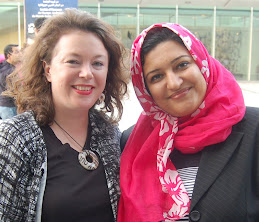
Khalid Haroun Al-Saleh, Abdullah’s father, works in Kuwait’s telecom industry. His family is originally Lebanese: His grandfather moved to Kuwait in 1956 in search of a better life after oil was discovered in the region.
Today the family consider themselves Kuwaiti, but live in a neighborhood designated for foreign nationals. Khalid and Amaal, a stay-at-home mother, have three sons. Abdullah is the eldest. Muhammad, 20, teaches nursing and Abdel-Rahman, 18, is an engineering student.
When Abdullah was 2, he stopped speaking – the first indication that something was wrong.
The journey to a diagnosis was long and exhausting. Abdullah’s condition was not recognized in Kuwait. A Syrian doctor told Khalid his son had an autism spectrum disorder, but his diagnosis was formally rejected by the Kuwaiti Ministry of Health. The family took Abdullah to a neurosurgeon, and after extensive testing and analysis, the diagnosis of autism was delivered once again.
But that wasn’t the family’s only problem. The Gulf War began in 1990, and they fled Kuwait for the relative safety of Lebanon.
In 1994, after their return to Kuwait, the Health Ministry finally acknowledged that Abdullah had autism: a disorder of neural development, characterized by impaired social interaction and communication and by restricted and repetitive behavior.
But what to do? All his parents could find were a couple of explanatory brochures.
“I felt that my son was in jail,” Khalid said. “And that I was running around everywhere, looking for the key.”
Misunderstanding in Montgomery County

Kayleigh also was 2 when her mother, Marlene, first suspected something was wrong.
Her daughter crawled, walked and met all her developmental milestones. She put puzzles together quickly and repeated everything she heard, a symptom of autism known as echolalia.
“If I look back, she wasn’t talking to me,” Marlene said. “She was just talking to the air.”
Marlene, who trained as an elementary school teacher and has a degree in elementary education and psychology, suspected her daughter might be autistic. But no one in her family believed her.
After Kayleigh’s diagnosis, she contacted the Autism Society of America, which was at the time the only organization of its kind in the United States. The society sent some pamphlets – mostly about diagnosis.
“What I was hoping for was some information on treatment,” she said. “I just wanted information on where to go. There was nowhere to go. You just have to trust your own judgment, and that’s very scary.”
Under federal law, Kayleigh was eligible for help under the Individuals With Disabilities Educational Act (IDEA). The family enrolled her in a preschool program which offered special education and some limited speech therapy, but it didn’t seem to have much effect.
Marlene read everything she could find about autism, and came across a book about a successful new program developed by Dr. O. Ivar Lovaas of the University of Los Angeles.
But the program wasn’t offered locally, and in any case, the school system wouldn’t pay for it. So the McConnells set up their own program, paying for it out of their own pockets.
They turned the basement of their home into a classroom, and, with guidance from Dr. Lovaas, trained college students to work with Kayleigh for two three-hour shifts a day, weekends included. (Behavioral programs like this are now the methodology of choice.)
“We went through 26 students in four years,” Marlene said. “We trained and worked with them.”
Struggling to learn
“Right away, you find out there’s no cure,” Marlene said. “Right away, you find out the confusion in the medical community. Everything’s anecdotal – the things people are trying – and that hasn’t changed.”
With Kayleigh “everything had to be fed to her like you put data into a computer,” Marlene said. “She did not learn from her environment.”
If a normal child learns something the 10th time it is taught to him, a child with autism learns the 100th or 200th time, Abdullah’s father said, offering this advice: “Don’t get discouraged.”
In 1994, Dr. Samira Al-Saad, the Kuwaiti mother of an autistic child, founded the Kuwait Center for Autism, having previously established a center in Jeddah.
Abdullah was one of the first children to enroll in the center’s programs. He also attended regular school until seventh grade. The school was supportive of him, and of his family’s goal to help him integrate, but the other children didn't accept Abdullah and he was harassed and bullied.
For a time, Kayleigh attended an inclusive kindergarten program in her local public school, “but the regular school wasn’t ready,” Marlene said. “Teachers weren’t equipped.”
Kayleigh transferred to the Ivymount School in Rockville, Md., a special needs school with an autism program. The school was a long bus ride away, so in 2000, the family moved closer.
“Truthfully, everything revolves around autism,” Marlene said. “It affects everything she does, so it affects everything we do. You can’t really have a normal life if you have a kid with autism

No comments:
Post a Comment